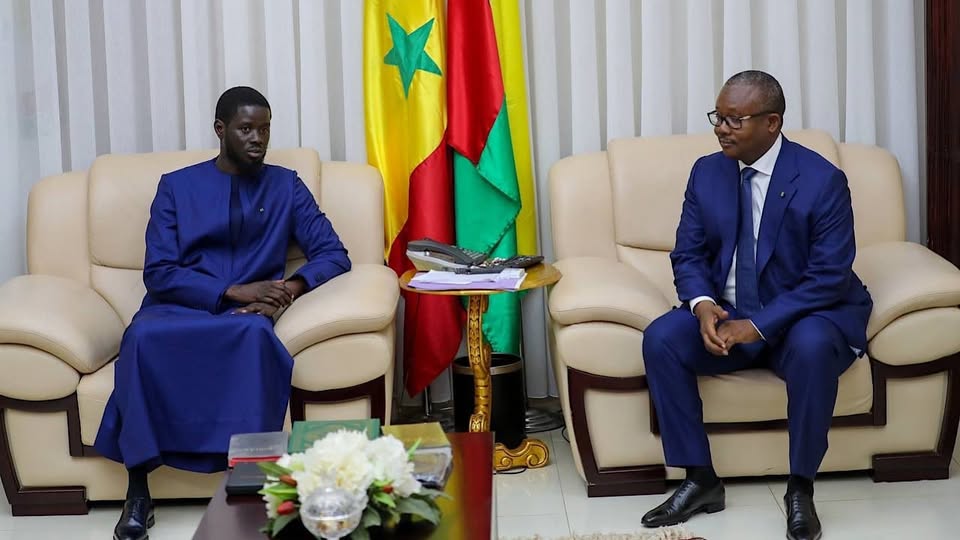By Lamin Sam Jaiteh
𝑇ℎ𝑒 𝑝𝑜𝑙𝑖𝑡𝑖𝑐𝑎𝑙 𝑙𝑎𝑛𝑑𝑠𝑐𝑎𝑝𝑒 𝑖𝑛 𝑆𝑒𝑛𝑒𝑔𝑎𝑙 ℎ𝑎𝑠 𝑟𝑎𝑟𝑒𝑙𝑦 𝑓𝑒𝑙𝑡 𝑎𝑠 𝑐ℎ𝑎𝑟𝑔𝑒𝑑 𝑎𝑠 𝑖𝑡 𝑑𝑜𝑒𝑠 𝑡𝑜𝑑𝑎𝑦.
𝑂𝑛 𝑜𝑛𝑒 𝑠𝑖𝑑𝑒 𝑠𝑡𝑎𝑛𝑑 𝐵𝑎𝑠𝑠𝑖𝑟𝑜𝑢 𝐷𝑖𝑜𝑚𝑎𝑦𝑒 𝐹𝑎𝑦𝑒 𝑎𝑛𝑑 𝑂𝑢𝑠𝑚𝑎𝑛𝑒 𝑆𝑜𝑛𝑘𝑜, 𝑡ℎ𝑒 𝑓𝑎𝑐𝑒𝑠 𝑜𝑓 𝑎 𝑔𝑒𝑛𝑒𝑟𝑎𝑡𝑖𝑜𝑛 𝑒𝑎𝑔𝑒𝑟 𝑓𝑜𝑟 𝑐ℎ𝑎𝑛𝑔𝑒. 𝑂𝑛 𝑡ℎ𝑒 𝑜𝑡ℎ𝑒𝑟, 𝑓𝑜𝑟𝑚𝑒𝑟 𝑝𝑟𝑒𝑠𝑖𝑑𝑒𝑛𝑡 𝑀𝑎𝑐𝑘𝑦 𝑆𝑎𝑙𝑙, 𝑎 𝑓𝑖𝑔𝑢𝑟𝑒 𝑏𝑜𝑡ℎ 𝑟𝑒𝑠𝑝𝑒𝑐𝑡𝑒𝑑 𝑎𝑛𝑑 𝑟𝑒𝑠𝑒𝑛𝑡𝑒𝑑, 𝑜𝑓𝑡𝑒𝑛 𝑝𝑜𝑟𝑡𝑟𝑎𝑦𝑒𝑑 𝑏𝑦 𝑡ℎ𝑒 𝑦𝑜𝑢𝑡ℎ 𝑎𝑠 𝑡ℎ𝑒 𝑒𝑚𝑏𝑜𝑑𝑖𝑚𝑒𝑛𝑡 𝑜𝑓 𝑎𝑛 𝑒𝑟𝑎 𝑡ℎ𝑒𝑦 ℎ𝑜𝑝𝑒 𝑡𝑜 𝑙𝑒𝑎𝑣𝑒 𝑏𝑒ℎ𝑖𝑛𝑑.
As these two camps eye each other warily, a surprising intermediary has emerged: Umaro Sissoco Embalo, the president of Guinea-Bissau.
His appearance at the recent Investment Forum in Dakar was no mere ceremonial gesture. Embalo, who has managed to maintain ties with both the new administration and Macky Sall, is quietly carving out a critical role for himself in the region’s diplomatic chess game.
Those familiar with behind-the-scenes discussions say Embalo’s visit went beyond economic niceties.
The forum, they suggest, was a convenient cover for a more ambitious mission: persuading Diomaye Faye and Sonko to back Macky Sall’s bid for Secretary-General of the United Nations.
Sources quoted by Jeune Afrique describe Embalo as leading a full-blown lobbying effort on Sall’s behalf, casting him as “an experienced, respected, and credible leader” on the international stage. It’s a risky stance.
Within Senegal, Sall remains a polarising figure. Critics blame him for a decade of political repression, institutional stagnation, and murky financial management. But Embalo, undeterred, continues to champion dialogue.
He insists on his friendship with both sides, calling for reconciliation and greater international acknowledgment of his “big brother” across the border.
Embalo’s influence in Senegal is hardly new. When tensions flared in 2022, he took the unusual step of reaching out to Ousmane Sonko, following a conversation with human rights advocate Alioune Tine.
The following year, he hosted the signing of peace accords between the government and the MFDC in Bissau—a meeting that included Sonko, then still firmly in the opposition.
These moments have solidified Embalo’s reputation as a linchpin in Senegalese-Bissau Guinean relations. His approach is informal but effective, relying on both geographical closeness and his knack for building trust between rivals.
While many ECOWAS leaders struggle to appear impartial, Embalo has become known for his brand of pragmatic mediation.
Whether this proximity to all sides will strengthen sub-regional diplomacy or eventually cost Embalo politically remains an open question.
For now, what’s clear is that in the shifting sands of West African politics, Umaro Sissoco Embalo is one of the rare figures able—and willing—to bridge Senegal’s past and present.



